In 2023, Ireland witnessed another year of remarkable innovation from our frontline health workers. These dedicated individuals embraced their innovative spirit and pushed boundaries to find solutions for the challenges they encounter in their clinical practice. The healthcare sector is confronted with numerous complexities, including rising costs, an ageing population, and evolving patient expectations. To tackle these issues, the HSE has been actively supporting healthcare professionals through the Spark Programme, encouraging them to foster innovation and develop solutions.
The Spark Innovation Programme receives support from the National Doctors Training and Planning (NDTP), the Nursing and Midwifery Services Director (ONMSD), and the National Health and Social Care Professions Office (NHSCPO). In collaboration with EIT (Health Ireland-UK) and the Guinness Enterprise Centre, Spark Ignite 2023 provided a platform for healthcare professionals to showcase their ideas and receive funding, mentoring, and networking opportunities to embark on their healthcare entrepreneurial journey.
We are proud to present the stories of our healthcare workers who emerged as finalists in Spark Ignite 2023. These individuals have demonstrated their passion, creativity, and dedication to improving healthcare through their innovative projects.
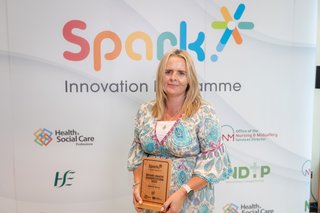
Siobhan Meany
Role: Clinical Lead Rapid Innovation Unit
Organisation: Theatre Nurse, St. John's Hospital
Innovation: Constant Pressure Device
County: Limerick
Congratulations to Siobhan Meany and her brilliant pitch on 'Constant Pressure Device' for winning the HSE Spark Ignite Competition at the HSE Spark Innovation Programme 2023.
As a Clinical Lead in the Rapid Innovation Unit at St. John's Hospital, she has led her team to create the 'Constant Pressure Device' to address a critical challenge faced by healthcare workers.
This device has the potential to save huge amounts of operation theatre time and deliver more efficient healthcare. By simplifying procedures and leveraging existing infrastructure, this device eliminates the need for continuous manual monitoring during laparoscopic surgeries, substantially reducing downtime in a resource intensive environment.
Notably, this solution stands as a unique offering in the market, reflecting the team's ingenuity, dedication, and empathy in frontline healthcare. Siobhan and her team's remarkable ability to develop a practical solution with far-reaching benefits for patients and medical staff alike is a testament to their commitment to advancing healthcare practices.

Matthew Reade
Role: Medical Physicist
Organisation: St Vincent's University Hospital
Innovation: Skin Dose Calculation Software
County: Dublin
Matthew Reade is a Medical Physicist at St Vincent's University Hospital in Dublin who is dedicated to addressing a significant problem in the field of interventional procedures through his groundbreaking innovation: Skin Dose Calculation Software.
In interventional procedures, patients are exposed to high doses of radiation, which can lead to tissue reactions like skin erythema within 24 hours. It is crucial to estimate the patient-specific skin dose (PSD) promptly to assess and monitor these reactions. However, the current manual estimation method is time-consuming, taking over a day to complete, and is prone to error due to assumptions and manual data extraction.
Matthew aims to reform this process by developing, validating, and distributing standardised, automated software for skin dose calculation. This innovative tool will swiftly and accurately calculate the PSD for each patient, saving valuable time and improving accuracy. By automating the process, healthcare professionals can assess and monitor patients undergoing high-dose interventional procedures in a timely manner.
The impact of Matthew's solution is remarkable, benefiting both patients and medical professionals. It ensures prompt and accurate assessment of skin dose for patients while allowing medical professionals to save time and resources. This efficiency enables them to focus on other critical responsibilities, such as quality assurance testing.
Matthew's standardised and automated software has the potential to change the estimation of patient-specific skin dose in high-dose interventional procedures, making it more efficient, accurate, and accessible for healthcare providers. His innovation has the ability to propel the field of medical physics forward, enhancing patient care, and contributing to the overall advancement of healthcare.
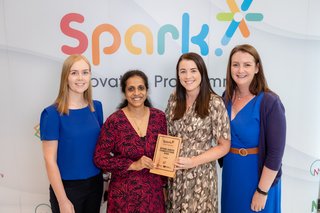
Smitha Kurian, Maura O'Donoghue, Eimear Flood, Louise Browne
Role: Senior Occupational Therapist (x2), Senior Physiotherapist (x2)
Organisation: Peamount Healthcare
Innovation: Rehab at Your Front Door
County: Dublin
Introducing the esteemed team of Smitha Kurian, Maura O'Donoghue, Eimear Flood, and Louise Browne from Peamount Healthcare in Dublin. These accomplished professionals hold senior positions as Occupational Therapists and Physiotherapists, and they are fervently dedicated to reshaping the field of rehabilitation through their groundbreaking innovation: Rehab at Your Front Door.
Within the realm of Peamount Healthcare, they are addressing a critical challenge faced by rehabilitation patients. The lack of proper step and front door assessments has led to a noticeable lack of confidence among patients and their families regarding the discharge process. This not only jeopardises the well-being of patients but also exposes therapists to increased risks during home visits. Imagine the arduous journey faced by the Occupational Therapy department in age-related rehabilitation, where a significant portion of their home visits in 2022 (25%) were primarily dedicated to assessing home access. These visits require a minimum of two therapy staff, resulting in the loss of valuable time equivalent to four therapy sessions.
In 2022 alone, the unnecessary home visits for the purpose of assessing home access amounted to an alarming 32 hours of therapy time wasted, nearly equivalent to a full week per year. And this is just for 45 out of the 100 rehabilitation beds. The impact on the entire service is profound. These home visits not only disrupt the length of stay for other patients, but they also divert therapists from crucial therapy and discharge planning time. Furthermore, Peamount Healthcare serves a catchment area where home visits can stretch up to an astonishing 65 km away from the campus, resulting in significant fuel costs and requiring the utilisation of transport vehicles from residential services.
The team proposes the implementation of a practice door equipped with adjustable features such as steps, a porch, and grab rails. With this innovative setup, therapists can effectively assess home access concerns within a controlled environment, eliminating the need for unnecessary home visits solely for assessment purposes. The implications of this solution are substantial, including saved therapy time, reduced transportation costs, efficient resource utilisation, heightened patient confidence in the discharge process, and a reduction in risks during home visits.
Smitha, Maura, Eimear, and Louise's visionary solution, featuring a practice door and adjustable steps, has the potential to bring reform to the age-related rehabilitation at Peamount Healthcare. Their unwavering commitment to improving outcomes and streamlining processes will greatly enhance the lives of patients and therapists, ensuring a smoother and more efficient rehabilitation journey for all.
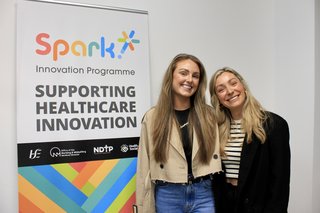
Anne-Marie Fay and Michelle Matthews
Role: Oncology Nurses working on clinical trials in Mater Hospital
Organisation: Mater Misericordiae University Hospital
Innovation: Answers for Cancers
County: Dublin
Anne-Marie Fay and Michelle Matthews are two dedicated Oncology Nurses at Mater Misericordiae University Hospital in Dublin. They have identified a critical problem in the realm of cancer care. With their innovative solution, "Answers for Cancers," they are set to revolutionise the way information is provided to cancer patients, transforming their journeys and improving outcomes.
In the current scenario, cancer patients at Mater Hospital lack a cohesive and accessible information system. The existing methods rely on disjointed verbal or paper-based communication, offering no real-time access to vital information. Patients struggle to find comprehensive resources tailored to their specific diagnosis, treatment plan, medications, follow-up care, and prognosis. This lack of cohesive information not only triggers anxiety, loneliness, and fear for patients and their families but also leads to an overwhelming reliance on phone calls and online searches, leaving them feeling lost in a sea of information.
Anne-Marie and Michelle understand the profound impact this problem has on patients and their families. The burden of stress and confusion during an already traumatic time is immeasurable. Moreover, the hospital systems are overwhelmed with increased phone calls, seeking explanations, clarifications, and guidance, further adding to the workload and frustration for both patients and healthcare providers.
They propose: "Answers for Cancers." This digital platform aims to transform the cancer care landscape at Mater Hospital. While similar solutions exist for other diseases, Anne-Marie and Michelle recognized the urgent need for a tailored and streamlined source of information specifically for cancer patients. With "Answers for Cancers," patients will have access to a comprehensive digital platform from the moment of diagnosis through aftercare and survivorship. This bespoke resource will bridge the information gap, empowering patients to access and understand critical information relevant to their unique cancer journey.
By implementing "Answers for Cancers," Anne-Marie and Michelle strive to enhance patient experiences, alleviate anxiety and fear, and relieve the burden on hospital systems caused by increased inquiries. This innovative solution has the potential to revolutionise cancer care by providing accurate, accessible, and personalised information at every stage. Patients and their families will no longer feel overwhelmed or lost, but rather empowered with knowledge and guidance.
Through their offered solution of "Answers for Cancers," Anne-Marie Fay and Michelle Matthews aim to improve patient outcomes, enhance quality of life, and pave the way for a future where cancer patients have all the answers they need, readily available.
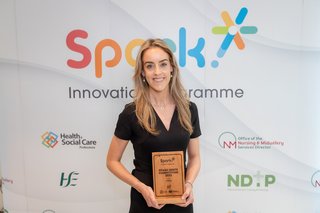
Claire Stenson
Role: RCSI Graduate Entry Year 1 Tutor / General Surgery SHO at Beaumont Hospital
Organisation: RCSI/Beaumont Hospital
Innovation: Smart Pleuro
County: Dublin
Claire Stenson, is an RCSI Graduate Entry Year 1 Tutor and General Surgery SHO at Beaumont Hospital in Dublin. Her solution, "Smart Pleuro," aims to change the management of malignant pleural effusion (MPE).
MPE treatment often has a low success rate and requires repeated interventions, significantly impacting patients and healthcare systems. However, with "Smart Pleuro," Claire envisions a future with reduced re-interventions, improved patient experience, and optimised resource utilisation.
By addressing the limitations of existing options, "Smart Pleuro" has the potential to enhance the success rate of chemical pleurodesis and alleviate the burden on patients, clinical staff, and healthcare systems. This innovation holds promise for transforming the management of MPE and improving patient outcomes.
Chemical pleurodesis, the first-line treatment for MPE, can have a success rate as low as 43% to 50%, leading to the need for re-interventions due to MPE recurrence. This not only impacts patients psychologically but also increases hospital visits and readmissions. Clinical staff face challenges with procedure failures and subsequent re-interventions, adding strain to an already overwhelmed system. Hospital administrators also grapple with issues of bed capacity, scheduling difficulties, and downstream effects.
Malignant pleural effusion affects a significant number of patients, with over 150,000 new cases reported annually in the US alone. The financial burden is substantial, with the cost of bedside talc pleurodesis reaching up to $11,224, resulting in an estimated annual expenditure of approximately $1 billion in the US alone. It is evident that there is an unmet clinical need.
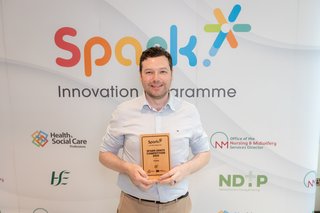
Leon O’Hagan
Role: Senior Pharmacist - HSE iSIMPATHY Project
Organisation: Primary Care - GP Practice/ Community Health Networks
Innovation:Polypharm.ai/ Polyphamacy medication scanner tool
County: Louth
Polypharmacy, the use of ten or more regular medications by patients, is a silent problem affecting patients and straining healthcare systems. Leon O'Hagan, Senior Pharmacist working on the HSE iSIMPATHY Project, is determined to address this issue and provide a much-needed solution.
In Ireland, over 250,000 patients fall into the polypharmacy category, with a staggering 45% of them under the age of 65. Inappropriate polypharmacy affects 21.4% of older adults living independently and a striking 70% of older adults in long-term care facilities, contributing to 10% of emergency admissions in individuals over 65. However, 71% of these cases are avoidable.
The financial impact of this issue is significant. In the UK, 75% of individuals aged 75 and over have more than one long-term condition, and over 85% of people in this age group in Wales are estimated to have taken at least one prescription medicine in the past year. However, only half of these medications are taken as intended, resulting in waste and cost. The UK wasted £200 million annually on unused medications in 2007, with several hundred tonnes of medicine being disposed of each year by health service users.
The toll on human lives is equally devastating. In the US, up to 98,000 medication-related deaths occur each year, many of which could be prevented. In England, preventable adverse drug reactions cost the NHS over £98 million and consume 181,000 bed days.
To address this crisis, Leon O'Hagan has developed Polypharm.ai, an innovative medication scanner tool. This cutting-edge solution will streamline and assess medication regimens with precision. Polypharm.ai empowers healthcare providers to accurately assess polypharmacy and patient adherence to medication, leveraging advanced algorithms and technology to make informed decisions, improve patient outcomes, and save lives.
Polypharm.ai goes beyond preventing adverse drug reactions and reducing costs. It aims to enhance patients' quality of life, mitigating unnecessary risks and complications. It also enables healthcare providers to optimise resources, reduce waste, and prioritise compassionate care. Leon O'Hagan's dedication and groundbreaking innovation offer a transformative approach to medication management. The solution is within reach, and by embracing it, we can make a lasting impact on the lives of patients and the healthcare system as a whole.
Calling all healthcare professionals with groundbreaking ideas!
The Spark Ignite Competition wants YOU to join our next cohort. Whether you're a doctor, nurse, pharmacist, or any other healthcare expert: if you have an innovative product or service that can improve health outcomes, we want to hear from you.
With the support of industry mentors and deep domain experts, you'll receive valuable guidance to turn your vision into reality. Imagine the impact you could make in transforming healthcare practice in Ireland and beyond!
Don't miss this opportunity to be part of something extraordinary. Reach out to us at spark@hse.ie and let's ignite innovation together. Join the Spark Ignite Competition and shape the future of healthcare.